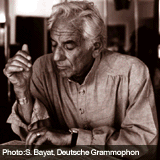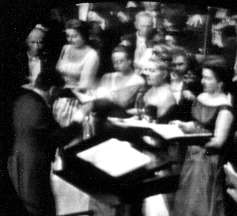
October 15, 1990
Milo L. Wadlin

It was late in the year 1962 that I met perhaps the greatest man I shall ever meet. President Kennedy was in the White House, West Side Story was still playing in New York's theater district, I was an impressionable ten year old preparing to sing at the opening of Lincoln Center, and that great man, Leonard Bernstein, was conducting. With the passing this week of Maestro Bernstein, I have felt a twinge of loss. My preference has been to dwell on distant, more pleasurable memories of the man.
My first view of Lincoln Center from New York's Columbus Avenue made me squirm with excitement in my seat. I was just one of more than seventy members of a boychoir who had been practicing for months in anticipation of performing with the New York Philharmonic. At first sight Lincoln Center was splendid and rather futuristic. The combination of white arches and glass were like nothing we, the boys of the boychoir, had ever seen before. Inside Lincoln Center's Philharmonic Hall it was just as impressive. It was barely completed in time for the opening. The gold walls and dark red carpets were wasted on the black-and-white television cameras of the day, but the TV audience would still find it striking.
Backstage was another matter. The dressing rooms were far from finished. Much of it was unpainted cinderblock. We had to go through often unlit corridors and rooms, stepping over long pieces of lumber and slipping between stacks of building materials. As an adult, I am appalled at the memory of wires hanging down and switches tilting wildly out of the wall. At the time, it just added to the sense of adventure.
At rehearsals, we spent long periods amusing ourselves backstage. We practiced card tricks, played Cat's Cradle and Jacob's Ladder with lengths of string, and a few were able to concentrate enough to read paperbacks. Even when we were on stage there were long periods of enforced inactivity.
We had never been led by anyone but our own conductor, Mr. Bryant. We would have been nervous no matter who else was conducting, but to be led by Leonard Bernstein filled us with awe and trepidation. He turned out to be demanding, a perfectionist as you might expect, but not frightening. He treated us with as much respect as he did any of the other professional performers, though we were by far the least experienced. (Just as a boy is getting experienced, his voice will change and a younger boy takes his place.) He was energetic and his direction was unambiguous -- -- we never missed a cue. He spent enough time in the air that you might have thought he was conducting from a trampoline instead of a wooden step.
The acoustics of the hall were to be controlled through "acoustic clouds," six sided baffles above the stage area that were lowered or raised from the ceiling. Mr. Bernstein spent hours doing nothing but trying to get those acoustic clouds properly arranged. He would start the choir singing and the orchestra playing and then would run to the back or side of the hall, or perhaps the balcony, to listen to the acoustics. He would disappear through a doorway and we would muddle along for a time without him. Just when we thought he must be lost, he would reappear in another part of the hall. No matter how the clouds were arranged, the hall had a rather dead sound. Finally he gave up. It was evident that he was far from satisfied, but there was nothing to be done and he appeared resolved to make the best of it. (It was more than a dozen years later that they gutted the place and finally fixed the acoustics.)
Twenty eight years later, I remember stealing an opportunity to shake Leonard Bernstein's hand after the final rehearsal. Five minutes later, however, I could not remember a word that was said either by him or by me. It seemed like a dream that happened near the timpani. I am sure he took no real notice of the event.
He did, however, remember our boychoir, the Columbus Boychoir, a year later when he wrote "The Kaddish", a Jewish prayer for the dead, in honor of our slain President, John F. Kennedy. He asked us to be part of its first performance, there in Philharmonic Hall. Later, we were privileged to make a recording with him. I am now sorry that I shall never have any such privilege again. I remember The Kaddish well enough that even now I believe I could sing it. I believe I will sing it for him.